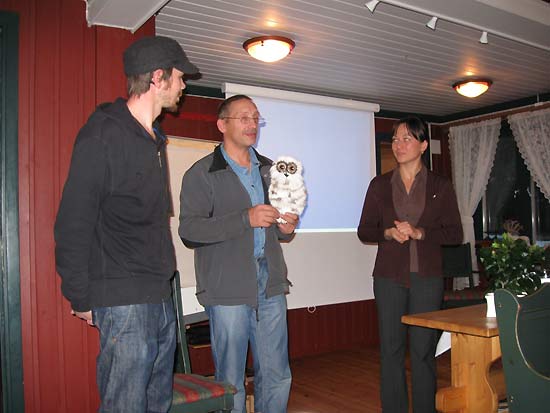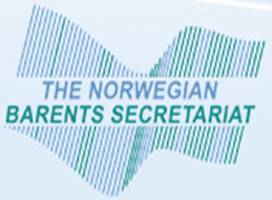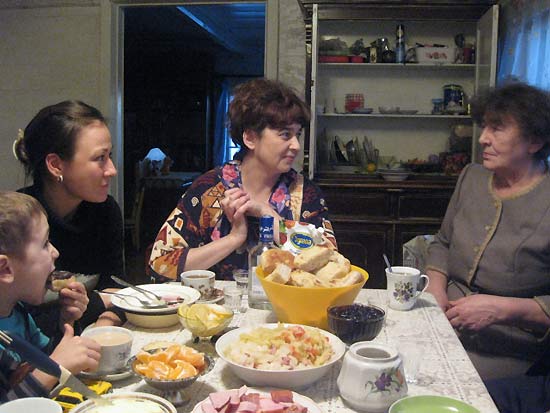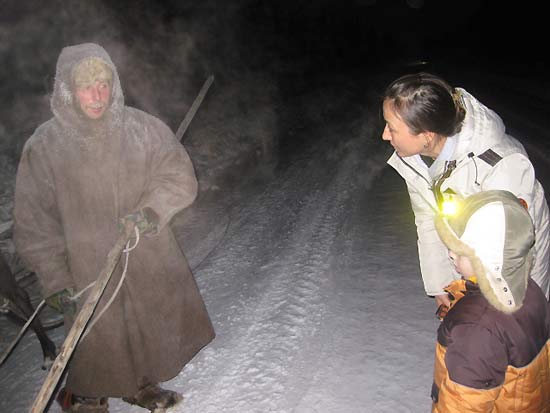- Ru
- En
- Fr
- Cn
Project: partnership for community and economic development in Izhma region of the Komi republic

Rector Nikolay Tskhadaya meets official delegation of Finnmark University College, September, 2010 (from left): Kåre Haukland, IT-koordinator, Per Møller, koordinator of the BNS program, professor Bjørn Sagdahl, teacher of the BNS program, Nikolay Tskhadaya, Rector of USTU, associate professor Tor Gjertsen, Leader of the TN on local and regional development, George Korshunov, rector's assistant in international affairs, Valeria Golubeva, Head of international department.
Activity report 2010
The Uarctic Thematic Network on Local and Regional Development took in early September an initiative to establish a regional development partnership in the Izhma region together with local and regional authorities, the business community and civil society organization, first of all, Izvatas, the main interest organization of the Izhma-Komi people.
The first official visit of Tor Gjertsen, leader of the UArctic network to Ukhta State Technical University (USTU) and Syktyvkar State University (SSU) took place in the beginning of September 2010. The first step in the international project of cooperation was participation of three representatives of Izhma region and USTU at the Gargia conference 2010 on local community and economic development in indigenous regions of the north in late October. Apart from the Izhma-Komis, three more reindeer herding peoples of Russia were represented at the conference and following excursion to the municipality of Tana in East Finnmark. Both the Gargia Conference and the first visit to the Izhma region were financed by the so-called UArctic-funding from the Norwegian Ministry of Education and Research.

Nikolay Rochev thanks Pal, the host of the Gargia fjellstua, for open-armed wellcome and gives a symbolic present — wise polar owl to protect this hospitable house.
At the Gargia Conference 2010 Nikolay Rochev, leader of Izvatas, Irina Koroleva, Head of the Agriculture department of Izhma region, and Valeria Golubeva, representative of USTU, reported on the present economic, cultural and social situation in the Izhma region, with emphasis on positive and negative tendencies in the regional development process going on at the time. The Komi delegation developed close relations and cooperation with the Yakutian delegation, at the conference and during the excursion to Tana. The Yakutian delegation included representatives of evenks and yukaghirs, indigenous peoples of southern and northern Yakutia, of the rural municipality of Oktjemsty close to Yakutsk, and of the Institute of Finance and Economics at the North Eastern Federal University of Russia (former Sakha State University). The sharing of experiences from several R&D-projects in rural Yakutia, initiated and coordinated by the thematic network on local and regional development, helped the Izhma-Komi delegation in the elaboration of the new project for a development partnership for the Izhma region and to formulate the overall goals for this partnership.
The project was then presented to the Norwegian Barents Secretariat together for an application for funding of an international start-up partnership conference, mapping of potential future productive projects, and the participation of Norwegian network members in three local development workshops in the Izhma region preferably in the beginning of June 2011.

In December 2010, after the funding from the Norwegian Barents Secretariat was secured, the leader of the international development network of the University of the Arctic went back to the Komi Republic to help form the partnership for social and economic development of the Izhma region, and discuss details of the upcoming Summer Business School with faculty members at USTU and SSU, and held the start-up conference for the representatives of the Izhma region, both from public authorities and the business community.

Meeting with the Groshev's family in Lasta village of the Izhma region who has intention to establish their own guest house with ethnic-cultural content (from left): Valeria Golubeva, representative of USTU with her 5 year old son Denis, Evgeniya Grosheva and her mother Zoya.
Between Christmas and New Year a working group with professionals from USTU and SSU went back to Izhma to map potential productive projects to be included in the local development workshops planned to take place in the region in the beginning of June 2011. After two days of consulting with locals, 25 different productive or entrepreneurial projects were registered.

Izhma reindeer breeder on the road from Izhma to Lasta village.
The majority of the suggested projects are in the category of micro and small business enterprises with a strong social and/or ethnic component. Projects are located mainly in the spheres of tourism (based on sport, ethnic, cultural and educational activities), wood processing industries (production of blockhouses, plank wood, window packages, parquet floor, etc.), farming (animal breeding and dairy), construction (mainly interior repair works, reconstruction), information and transport services, seen separately or in relation to other social, cultural and/or economic activities such as tourism and library and museum functions. The common denominator and challenge for all the proposed productive projects is knowledge and capacity building, and of course funding, both in relation to the individual projects and its owner, but also the newly founded Izhma development partnership.
Action plan 2011
The main project activity in 2011, coordinated by the UArctic thematic network, is the planning, organization and implementation of two or possibly three rural development workshops and the Summer Business School in the Izhma region during the first two weeks of June. That include participation in one, or preferably two, of the partnerships planning meetings during the spring, the first in week 12 and the second just after Easter, of the network leader and project coordinator. At the development workshops in Izhma in June, Elin Sabbasen, the director of Gaisa Business Park in Tana, Norway, will also participate as a resourse person, expert on micro credit and the use of micro credit working groups in promoting local community and economic development. In addition to cover travel and accommodation costs for three persons the project money from the Norwegian Barents Secretariat will also be used to pay a modest honorarium to the local coordinator Valeria Golubeva and Elin Sabbasen for their services at the rural development workshops and Summer Business School in Izhma in June.
Apart from a substantial participation from the Department of Economy at Ukhta State Technical University, the Faculty of Economics and Fino – Ugric Cultural Centre at Syktyvkar State University, the Institute of Finance and Economics at North Eastern Federal University in Yakutsk, several instructors from Syktyvkar state academy will also take part in the Izhma Summer School of Business. A special training program has being developed for people who want to start their own new businesses.
| Tor Gjertsen | |
| Valeria Golubeva | Alta, 02.2011 |

